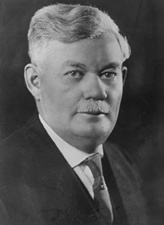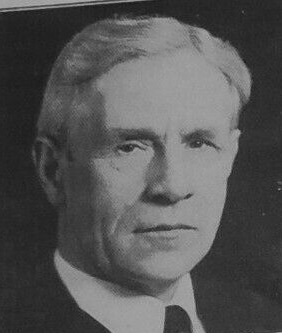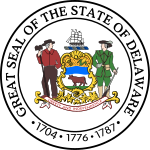
The 1978 United States Senate elections were held on November 7, in the middle of Democratic President Jimmy Carter's term. The 33 seats of Class 2 were contested in regular elections. Special elections were also held to fill vacancies. Thirteen seats changed hands between parties, resulting in a net gain of three seats for the Republicans. Democrats nevertheless retained a 58–41 majority.

The 1972 United States Senate elections were held on November 7, with the 33 seats of Class 2 contested in regular elections. They coincided with the landslide re-election of Republican President Richard Nixon. Despite Nixon's landslide victory, Democrats increased their majority by two seats. The Democrats picked up open seats in Kentucky and South Dakota, and defeated four incumbent senators: Gordon Allott of Colorado, J. Caleb Boggs of Delaware, Jack Miller of Iowa, and Margaret Chase Smith of Maine. The Republicans picked up open seats in New Mexico, North Carolina, and Oklahoma, and defeated one incumbent, William B. Spong Jr. of Virginia.

The 1970 United States Senate elections was an election for the United States Senate. It took place on November 3, with the 33 seats of Class 1 contested in regular elections. Special elections were also held to fill vacancies. These races occurred in the middle of Richard Nixon's first term as president. The Democrats lost a net of three seats, while the Republicans and the Conservative Party of New York picked up one net seat each, and former Democrat Harry F. Byrd Jr. was re-elected as an independent.

The 1964 United States Senate elections were held on November 3. The 33 seats of Class 1 were contested in regular elections. Special elections were also held to fill vacancies. They coincided with the election of President Lyndon B. Johnson by an overwhelming majority, to a full term. His Democratic Party picked up a net two seats from the Republicans. As of 2022, this was the last time either party has had a two-thirds majority in the Senate, which would have hypothetically allowed the Senate Democrats to override a veto, propose constitutional amendments, or convict and expel certain officials without any votes from Senate Republicans. In practice, however, internal divisions effectively prevented the Democrats from doing so. The Senate election coincided with Democratic gains in the House in the same year.

The 1962 United States Senate elections was an election for the United States Senate. Held on November 6, the 34 seats of Class 3 were contested in regular elections. Special elections were also held to fill vacancies. They occurred in the middle of President John F. Kennedy's term. His Democratic Party made a net gain of four seats from the Republicans, increasing their control of the Senate to 68-32. However, this was reduced to 67-33 between the election and the next Congress, as on November 18, 1962, Democrat Dennis Chávez, who was not up for election that year, died. He was replaced on November 30, 1962, by Republican appointee Edwin L. Mechem. This was the first time since 1932 that Democrats gained seats in this class of Senators.

The 1958 United States Senate elections were elections for the United States Senate which occurred in the middle of President Dwight D. Eisenhower's second term. Thirty-two seats of Class 1 were contested in regular elections, the new state of Alaska held its first Senate elections for its Class 2 and 3 seats, and two special elections were held to fill vacancies.

John Gillis Townsend Jr. was an American businessman and politician from Selbyville in Sussex County, Delaware. He was a member of the Republican Party who served one term as Governor and two terms as U.S. Senator from Delaware.
Wilbur Louis Adams was an American lawyer and politician from Wilmington, in New Castle County, Delaware. He was a member of the Democratic Party, who served as U.S. Representative from Delaware.

The 1934 United States Senate election in Tennessee was held on November 5, 1934. Incumbent Democratic Senator Kenneth D. McKellar was re-elected to a fourth term in office, defeating Republican former Governor Ben W. Hooper.

The 1822–23 United States Senate elections were held on various dates in various states. As these U.S. Senate elections were prior to the ratification of the Seventeenth Amendment in 1913, senators were chosen by state legislatures. Senators were elected over a wide range of time throughout 1822 and 1823, and a seat may have been filled months late or remained vacant due to legislative deadlock. In these elections, terms were up for the senators in Class 2.

The 1968 United States Senate election in Pennsylvania was held on November 5, 1968. Incumbent Democratic U.S. Senator Joseph S. Clark Jr. sought re-election to a third term but was defeated by Republican U.S. Representative Richard Schweiker.

The 1938 United States Senate election in Wisconsin was held on November 8, 1938. Incumbent Democratic U.S. Senator F. Ryan Duffy ran for a second term in office. In a three way race, Alexander Wiley defeated Duffy and Lieutenant Governor Herman L. Ekern.

The 1952 United States Senate election in Tennessee was held on November 4, 1952. Incumbent Democratic Senator and President pro tempore of the Senate Kenneth D. McKellar ran for re-election to a seventh term in office but was defeated in the Democratic primary by U.S. Representative Al Gore Sr. Gore easily won the general election against Republican Hobart Atkins.

The 1946 United States Senate election in Indiana took place on November 5, 1946. Incumbent Republican U.S. Senator Raymond E. Willis did not run for re-election. Former interim Senator William E. Jenner was elected over Governor of Indiana M. Clifford Townsend.

The 1928 United States Senate election in Delaware took place on November 6, 1928. Incumbent Republican U.S. Senator Thomas F. Bayard Jr. ran for a third term in office, but was defeated by former Republican Governor John G. Townsend Jr. in a landslide.

The 1940 United States Senate election in Delaware took place on November 5, 1940. Incumbent Republican U.S. Senator John G. Townsend Jr. ran for re-election to a third term in office, but was defeated by Democrat James M. Tunnell. This was the only seat that Democratic flipped during this cycle. This was the last time Democrats won Delaware's Class 1 Senate seat until Tom Carper's victory over Senator William Roth in 2000.

The 1928 United States Senate election in Tennessee was held on November 6, 1928. Incumbent Democratic Senator Kenneth McKellar was re-elected to a third term in office, defeating Republican Mayor of Knoxville James A. Fowler.

The United States Senate election of 1934 in New Jersey was held on November 6, 1934.

The 1934 United States Senate election in Maryland was held on November 5, 1934.

The 1940 United States Senate election in Tennessee was held on November 5, 1940. Incumbent Democratic Senator Kenneth D. McKellar was re-elected to a fifth term in office, defeating Republican Howard Baker.


















